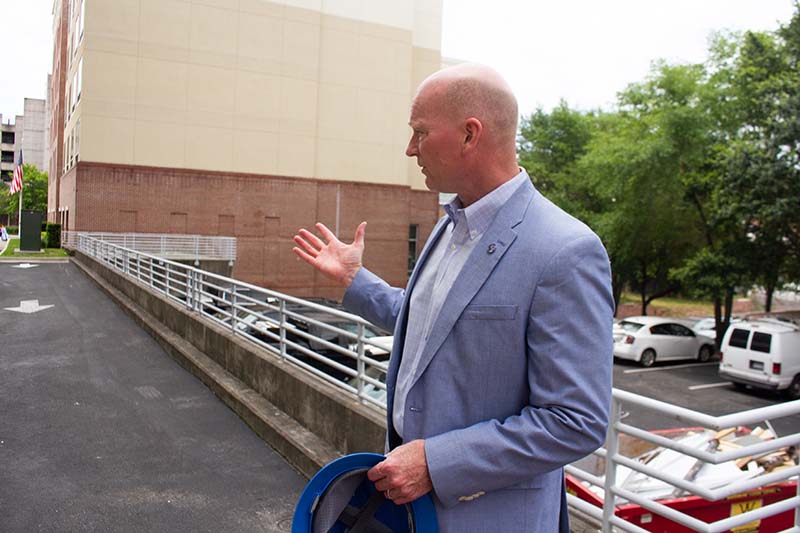Crews began gutting the first floor of the former Bank of America building earlier this month to make way for the property’s new operator, Cape Fear Community College. The renovated space will allow CFCC to expand its nursing and other allied health programs.
By early next year, the first floor of the downtown building – with floor-to-ceiling windows facing North Third Street – will house two large lecture halls to accommodate classes in CFCC’s health and human services programs. Half of each of the second and third floors will soon be transformed into hospital simulation and nursing labs with teaching and office suites.
Several factors are helping CFCC’s fast-tracked timeline, which bets on welcoming a new cohort of 60 nursing students for its spring semester classes that begin in January 2024.
“We’ve been aggressive with the plan from the beginning,” said CFCC President Jim Morton.
New real estate
New Hanover County
purchased the five-story building at 319 N. Third St. for CFCC for about $11.4 million earlier this year. CFCC will lease the property from the county for nine years at $1 annually; eventually, the college will own it outright.

The closing was slightly delayed by litigation between previous owners of the building over parking spaces; that issue was resolved by carving out 14 spaces from the property, leaving CFCC with roughly 100 (losing those spaces cut $500,000 from the previously considered purchase price of about $11.9 million). While the parking spaces will be nice to have, Morton said the real benefit the roughly 1.5-acre lot of prime downtown real estate presents is the college can use it for future planning purposes. “It gives us the ability to potentially build up,” Morton said.
David Kanoy, CFCC’s executive director of capital projects and facilities, said a similar new building would cost about $500 per square foot to construct. At 55,000 square feet, that would cost roughly $27.5 million – which doesn’t include land. Including estimated upfit costs ($14.8 million, which the county is also covering), the total cost to get the property ready for its new use will be roughly $27 million – including the land and adjacent parking lot.
Built in 2014, the building was always half-empty, according to Kanoy.
“The building was never more than 45% occupied,” Kanoy said. “It’s definitely underutilized as a commercial building.”
The west side of the second and third floors, where construction to install the labs will soon begin, was never finished. These areas were left like shells so tenants could utilize them however they saw fit. But with no tenants to ever lease the spaces, it “makes it easier for us,” Morton said. A dearth of parking made it difficult for companies to choose to locate in the building, Morton said.
Bank of America
closed its downtown branch (which occupied the first floor) in January 2020. The law firm Cranfill Sumner & Hartzog LLP (now Cranfill Sumner) once occupied the fourth floor and part of the third floor, but now is
based out of Autumn Hall. Suzy, the technology firm that
moved into the entire fifth floor in November 2021, offers its employees remote flexibility.
Some tenants have active leases in the building, but are scattered and with few employees reporting in person. “They’re not really active,” Kanoy said of the tenants.
CFCC taking on the building has actually created an opportunity for the tenants to exit their leases early, Morton explained.
The college planned to honor all tenants’ existing lease arrangements when it took over the building. However, when tenants approached CFCC officials about leaving early, it presented a win-win. “They had come to us interested in moving out,” he said. “It helps expedite our plans.”
Construction on phase two originally wasn’t planned for another two years, Morton said, but now, it could be just one year out.
Monteith Construction is leading construction on phase one, which will cost about $3 million, including equipment (each simulation mannequin costs about $150,000, Morton said). Phase two entails renovating the entire fourth and fifth floors. The fourth floor will allow CFCC to triple its dental space and double the amount of students. "We're in deseperate need for both [dental] hygiene and dental assisting," Morton said.
Correction: This article has been updated to correct the duration of CFCC's lease term with New Hanover County and the building purchase price.





